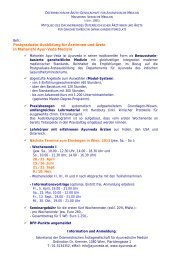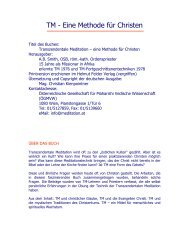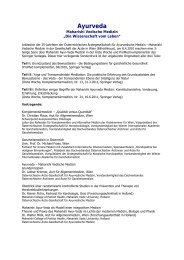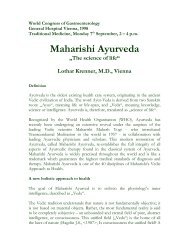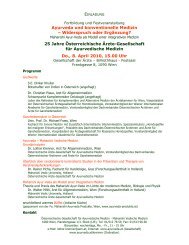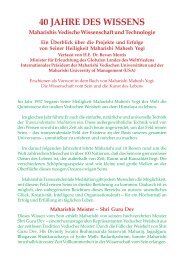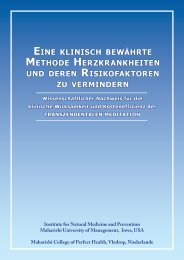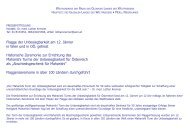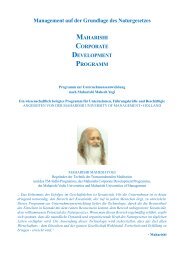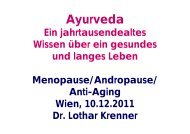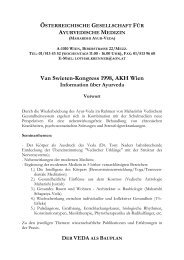Summary of Research Findings
Summary of Research Findings
Summary of Research Findings
You also want an ePaper? Increase the reach of your titles
YUMPU automatically turns print PDFs into web optimized ePapers that Google loves.
<strong>Research</strong> on the Maharishi Rejuvenation SM Program (continued)<br />
5. Title<br />
The Use <strong>of</strong> Sesame Oil and Other Vegetable Oils in the Inhibition <strong>of</strong> Human Colon Cancer<br />
Growth In Vitro<br />
Publication<br />
Anticancer <strong>Research</strong>, Vol. 11, pp. 209-216, 1991.<br />
Authors<br />
John W. Salerno and D. Edwards Smith.<br />
Conducted at<br />
Department <strong>of</strong> Physiological and Biological Sciences, Maharishi International University,<br />
Fairfield, IA 52556<br />
<strong>Summary</strong><br />
Sesame contains large quantities <strong>of</strong> the essential polyunsaturated fatty acid (PUFA), linoleic acid, in the<br />
form <strong>of</strong> triglycerides. The antineoplastic properties <strong>of</strong> many PUFAs such as linoleic acid and their metabolites<br />
are known. This study tested the hypothesis that natural vegetable oils, such as sesame oil and its component<br />
linoleic acid, when added to human colon adenocarcinoma cells growing in tissue culture, would inhibit their<br />
growth and that normal colon cells would not be similarly affected. Three human colon cancer cell lines and<br />
one normal human colon cell line were exposed to the following: (1) pure linoleic acid; (2) lipase-digested<br />
sesame oil; (3) undigested sesame oil; (4) five additional common vegetable oils; (5) mineral oil. Linoleic acid<br />
inhibited the in vitro growth <strong>of</strong> all three malignant human colon adenocarcinoma cell lines. The normal colon<br />
cell line showed dramatically less inhibition <strong>of</strong> growth. Lipase-digested sesame oil (LDSO) and undigested<br />
sesame oil (UDSO) produced greater inhibition <strong>of</strong> growth <strong>of</strong> all three malignant colon cell lines than <strong>of</strong> the<br />
normal colon cells. Five other common vegetable oils<br />
containing various amounts <strong>of</strong> PUFAs, such as corn,<br />
soybean, safflower, olive, and coconut oils, all in their<br />
lipase-digested form, were found to dramatically inhibit<br />
the growth <strong>of</strong> the HT-29 malignant human colon cell<br />
line. Undigested olive and safflower oils also inhibited<br />
the HT-29 cells, although not as markedly as the lipasedigested<br />
oils. Mineral oil did not inhibit the growth <strong>of</strong><br />
HT-29 cells. Both lauric and palmitic acid, which are<br />
saturated fatty acids found in abundance in coconut oil,<br />
inhibited the<br />
HT-29 cells more strongly than linoleic acid, while oleic<br />
acid did not inhibit. These results indicate that many<br />
vegetable oils, including sesame, contain in vitro antineoplastic<br />
properties; this finding warrants further investigation<br />
both in vitro and in vivo to assess their possible<br />
chemotherapeutic potential.<br />
Study 5 <strong>Research</strong> Highlights<br />
In vitro research with human colon cancer cell lines indicates that many natural vegetable oils, including<br />
sesame, contain in vitro antineoplastic properties. Further in vivo and in vitro investigation is warranted in<br />
order to assess oils’ possible chemotherapeutic potential.<br />
86



